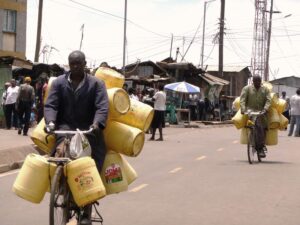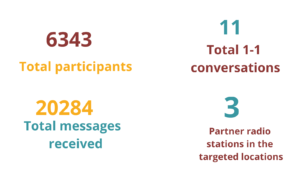The urban population in Kenya is on the rise with severe implications on provision of water and hygiene services in cities that are already experiencing water challenges as a result of pollution, infrastructure and water availability to meet the high and rising demand.
According to the World Bank Group report, “Kenya Urbanization Review,” more than 12 million Kenyans reside in urban settlements. The report projects that the numbers will triple to 40 million by 2050.
A walk in the slums paints a picture of squalid living conditions, a situation that has been exacerbated by overcrowding, lack of quality social amenities, poor planning and poor infrastructure. One would hardly miss to run into women and children making long queues to fetch the precious commodity. Carts transporting jerry cans of water would be all over. Middle class estates are not spared of this shortage either. Water bowsers have now become commonplace.

Photo by the Department of Engineering, Cambridge University
Impact of WASH services during COVID-19
The World Health Organisation’s recommendations on the management of the COVID-19 pandemic has made it clear that provision of key resources like water, sanitation and hygiene services must be prioritised by duty bearers. The COVID-19 pandemic has exposed the underbelly of underinvestment in the WASH over the decades. According to the World Health Organization, handwashing with soap for at least 20 seconds is one of the key weapons in fighting the deadly virus.
Despite high standards of hygiene being a prerequisite in the fight against COVID-19, the jury is still out on whether millions of citizens in the low income settlements in major cities in Kenya (Nairobi, Mombasa and Kisumu), have adequate access to safe drinking water, not to mention water for washing hands.
Our intervention
Combination of interactive radio and 1-to-1 SMS conversations
Oxfam-Global Kenya engaged Africa’s Voices Foundation (AVF) to support the implementation of the WASH project dubbed Covid19: protection of vulnerable households in informal settlements through assistance of water and hygiene Promotion. The project was designed to contribute to Oxfam’s public health messaging to promote positive behaviours as well as address stigma and misinformation in response to COVID-19 prevention. To do so, AVF deployed its radio and a mobile technology tool designed to enable radio dialogues and collect and analyse feedback from listeners via SMS relating to their perceptions, beliefs, and attitudes during the COVID-19 outbreak.
The Oxfam’s project aimed to reach 73,820 households in low income areas , specifically informal settlements and high density urban settlements in Nairobi (Kayole-soweto, Kibagare, Kibera,Kawangware), Kisumu informal settlements (Obunga, Nyalenda, Manyatta) and urban settlements in Mombasa (Old-town, Kibokoni) to address WASH challenges and cushion them against the impact of COVID-19 pandemic.
In the months of November and December 2020, AVF leveraged its partnership with regional radio stations (Radio Kaya, Ghetto Radio and Radio Nam Lolwe), to broadcast interactive radio shows in the country’s major cities targeting low income urban settlements on WASH matters. Partners were carefully selected to respond to the programming needs and ability to reach the target audience.
The radio stations hosted expert guests who helped to drive conversations on the importance of citizens following the right WASH and COVID-19 prevention practices while also demystifying rumours and addressing stigma by providing correct information about the pandemic. Listeners were encouraged to participate ( by asking questions or responding to the radio question) by sending their SMS responses to a toll-free number.
In addition, AVF’s unique 1-to-1 SMS platform called “Katikati” came in handy in carrying out in-depth conversations with individual listeners by using a tailored response to respond to questions and rumours, misinformation and stigma.
The project engagement in numbers

Key lessons from the project
The project recommendations are that:

Ignorance in most homes about the hand washing activities with little information from the community health workers, I believe some homes are neglected.
Citizens should be educated on the importance of conserving the environment and maintaining cleanliness every time.